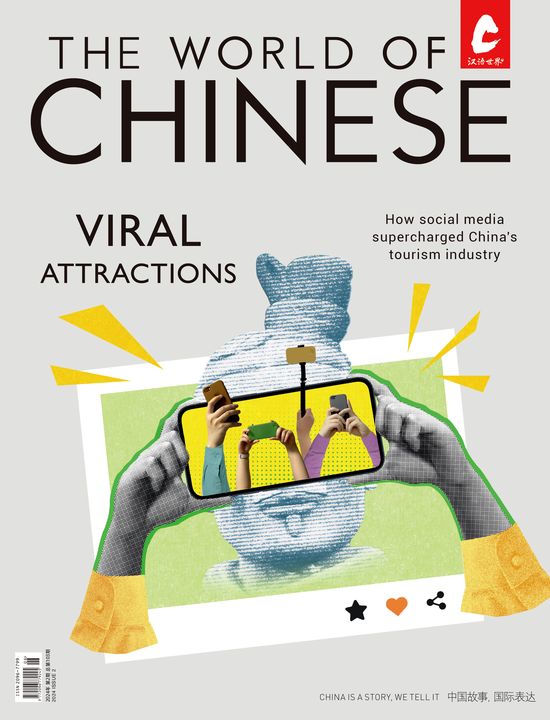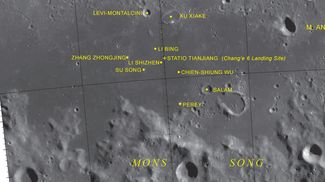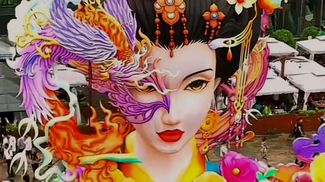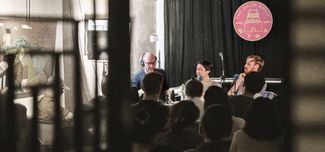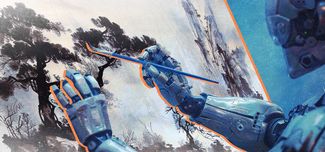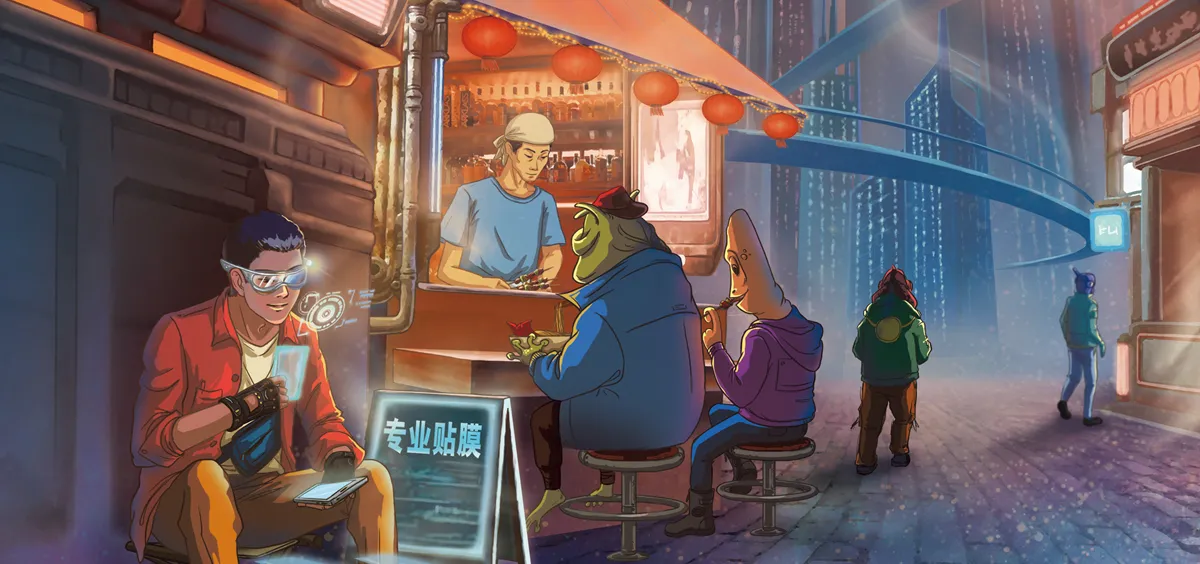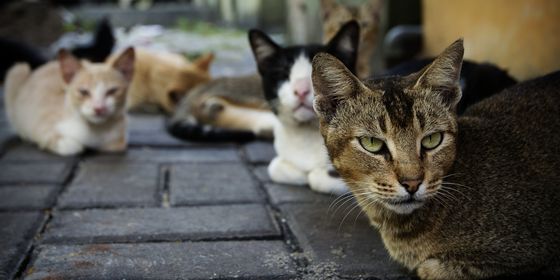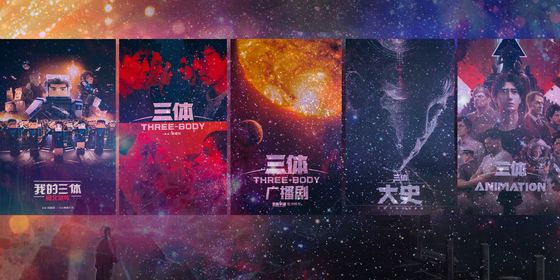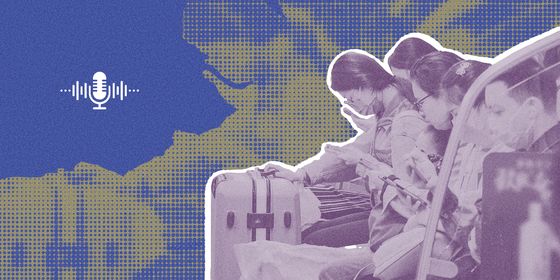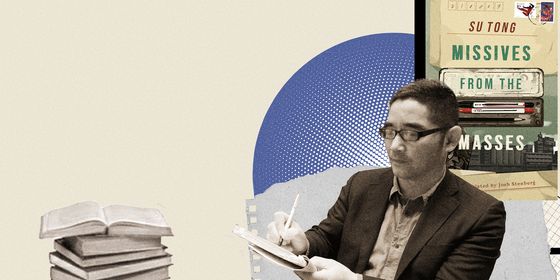A street stall seller finds himself at the center of an interplanetary business deal in Wang Nuonuo’s sci-fi short story
1
I finally figured it out. Get a job? Never again!
So I opened a stall on Earth. The location was great. It was the oldest transit spot in the galaxy within 20 astronomical units, so people on long journeys always came to Earth to restock on supplies. There was also an entropy market on Earth, so Earth could be considered a financial center. If my relatives asked me how I was doing, I could still tell them that I worked on Earth. That way, no one would know that I had been fired by the finance company.
At my stall, I sold protective films. Protective films were invented on Earth, but when the Galactic Era began, they became popular among all the galaxies. Some customers wanted films for their new spaceships, while others wanted them for their newborn babies. Protective films were not only a way to protect fragile items, but also a fashion, because it represented respect for non-renewable resources. It was said that on Planet Fan, which was 200 astronomical units away from Earth, young couples would apply film (with a composition similar to a cat’s amniotic sac) to each other’s face on Valentine’s Day. This meant they cherished each other, and the films could only be stripped off when they broke up, when the relationship shattered like a phone screen that was not protected by film.
Protective film application was a traditional roadside trade on Earth. As an immigrant, I was not very good at it. I was slow and there were always air bubbles. However, running a stall and applying protective films were only a ruse, and my real job was to offer business consultation. I still relied on my old trade to earn a living. Having worked in the entropy market for a few years, I had established connections with people from different fields. After the Galactic Era began, civilizations on the margins of space were gradually discovered. They had evolved independently, and had all sorts of strange cultures: some reproduced exclusively by parthenogenesis; some planets were engulfed by intelligent fungi, so the planet itself acquired the ability to think; some uploaded their consciousness collectively, so there were only 20 residents left on the planet to maintain computer systems—all the rest were enjoying their lives in hard disks. In these circumstances, I found plenty of business opportunities.
In the Age of Discovery, the French only offered African chiefs a few matchlocks for 30 slaves. Both sides chuckled about this deal, because the French could produce firearms on a large scale while the chiefs considered slaves and prisoners to be a burden. Similarly, although one civilization’s needs seemed odd to another, there were other civilizations that could satisfy them. Unfortunately, the Milky Way Union has been promoting universal moral standards and political correctness in recent years, so a lot of business deals could not be done openly. Even so, I was an exception. I was just a street vendor and I didn’t have a business license. If worse comes to worst, I could just run away.
2
My first customer, Wang Wang, was a friend whom I met through my previous job.
“I heard that you’ve started your own business?”
“I’m just running a stall.”
I took out a new protective film from its packet and quickly peeled off its backing. I had to do this as quickly as possible, or else dust would land on it.
“Don’t be so modest. I know you have connections…If you can help us to solve our problem, we can pay you this amount!”
I lifted up my head and glanced at him.
Wang Wang held up a finger, which bent and stretched quickly, over and over again. The bent finger represented 0, while the stretched one represented 1. Wang Wang’s civilization used the binary numeral system, so it took him a while to show me a large number.
“Let’s talk while I apply the protective film.”
Wang Wang was from Planet Two, which was called Planet Ten in their language.
The appearances of those Planet Two residents were strictly fractal. If a person had four limbs, they would have four fingers on each hand and four toes on each foot. Each finger would have four hairs, and each hair would split into four parts at the end, and so on.
However, if this person had five or six limbs (as in, they had one more genital, one more head, or both), then according to the fractal theory, they would have five or six fingers and each finger would have five or six hairs.
As they had different numbers of fingers, residents of Planet Two never developed a base-10 numeric system. “Yes” and “No” became their mathematical basis. In the Stone Age, residents of Planet Two used “Yes Yes Yes” to represent 3 and “Yes Yes Yes Yes” to represent 4.
However, everything had an upside. Residents of Planet Two were familiar with the binary system, so they had long entered the information age and they could make good use of advanced information technologies. Today, skilled computer programmers like Wang Wang were extremely sought after on Earth.
“Do you know anyone that works in memory storage?” Wang Wang whispered in my ear.
Wang Wang had five organs on his face (what we called facial features), and each organ had a hole on it. In each hole there was an eyelid-like thing formed by five mucous membranes.
“You want to find a contractor who works on memory storage? Yeah?”
“There is a sea creature on Earth called the shrimp, and this creature can only grow up by casting off its shell. Each civilization has its own shell. Long ago, residents of Planet Two gave up living as a family and abandoned the concept of gender, because they believed those were shells that hindered our development. Now we find that individual memories are new shells of our civilization.”
“The stall next door sells grilled shrimp.” I was a little hungry and there weren’t many customers coming now, so I ordered some grilled shrimp and oysters from next door. The vendor at that stall was a native Earthling, and he had to suffer the smoke and heat every evening—he didn’t have an easy life.
“Living without family, residents of Planet Two are no longer selfish; without the concept of gender, everyone is equal on Planet Two. Giving up our individual memories will help us to build a community of shared spirit. Of course, it’s impossible to completely eradicate one’s memories. There is always something that cannot be thrown away—like an old album—so we have to put them into storage.”
Chewing garlic chives, I asked him, “Then why come to me? You just need to upload your memories to a computer. I thought everyone on Planet Two was a programmer.”
“That’s the key problem: If everyone’s memories are uploaded to hard disks, which will definitely be encrypted, who should be asked to remember the passwords? If a group of reliable people are entrusted with remembering the passwords, will those passwords become their individual memories again?”
“I’ll help you remember the passwords. I’m not from your planet. If you and your people want to get your memories in the future, you can come to me.”
“It’s still the same problem. If all of our memories are uploaded, who will remember to come to you to get the passwords?”
I roughly understood. This was a catch-22. It was impossible to upload everyone’s individual memories, yet clear every resident’s mind. They had to remember and forget the past at the same time.
“Give me some time. I’ll think about it,” I said as I wiped the grease from my mouth. “You’re my friend. I’ll help you.”
3
I thought about it for a few days without coming up with anything satisfactory. In the meantime, I got much better at applying protective films. A customer cut his belly open this afternoon, and it took me just 30 seconds to apply a tempered glass film to his heart. As I was counting the money, the worst that could happen to a vendor happened.
“Urban management officers! Urban management officers!”
The owner of the fortune-telling stall next door was from the planet Prophecy, so he could manipulate the light cone to see events that will take place in the next two seconds. Gathering up his bamboo sticks and trigrams in a haste, he pushed a button hidden under the red tablecloth, turned his stall into a car, and drove away. The Earthling at the barbecue stall was quite calm. He opened the cloth bag he carried, which contained some change and a piece of paper covered in grease. Smoothing out the document, he handed it to the officer and said, “Sir, thank you for your hard work. I heard there was a new policy. Now street vending is being encouraged.”
The officer frowned and said, “Oh, so you’re well-informed…”
“The street economy is an indispensable part of the Milky Way Union’s economy!” The vendor smiled as he handed the officer some spicy grilled enoki mushrooms.
It was said that the enoki mushroom was the only thing on Earth that could play hide-and-seek with time. The enoki mushroom didn’t follow the second law of thermodynamics, so in ideal conditions, the energy stored in the enoki mushroom could be generated infinite times, so it was nicknamed “See you tomorrow.”
With such an enticing gift, the officer’s expression softened. He strolled away from the barbecue stall and straight to me.
“I just put on protective films…Now the Milky Way Union is promoting street economy.” I imitated the barbecue vendor.
“You’re a quick learner!” The officer arrogantly stepped on a film beside my hand and said, “I heard that you used to work in the entropy market? You’ve got some other line of business, right?”
It seemed that the urban management officer had already learned that I was offering business consultations, so I decided to confess.
“Do me a favor, then I’ll look the other way.”
“Yes?”
“Can you help us to have children?”
“What?”
In the next ten minutes, the urban management officer explained his backstory to me. He was from the planet Luan, whose people had a special way of reproducing: When the males became mature, all of their organs except their genitals would degenerate. Finally, these males would turn into cones that could neither move nor think.
Passing females could lay eggs on these cones, and each male could fertilize a thousand eggs. Then the zygotes would be incubated for around two thousand hours, during which they would use up the nutrition stored by the males. The younger generation usually finished growing when these cones became metabolic waste.
“So males on your planet are just walking genitalia?”
“Shh…Don’t say that! If the masculinists from our planet heard you, you’d be beaten to death.” The officer immediately put his hand over my mouth.
“How about you? Why didn’t you stay there and incubate children? Why come to Earth?”
“A group of males from my planet, who want to pursue our own careers, gave up the opportunity to bear children and went to seek a living on other planets. It’s quite strange. If we leave our planet before reaching sexual maturity, our body will not degenerate. We even have more strength and clearer perception. I’m not bragging. If I wanted to chase any vendor on this street, none of you could outrun me.”
“Isn’t that good? Now you and your fellow males have already left your planet and you guys no longer need to suffer the pain of reproduction…”
“But more and more males are leaving our planet. Now the ratio of males to females at childbearing age is 1 to 100 on our planet. If this doesn’t change, we’ll go extinct soon!”
4
The zygotes of Planet Luan’s residents were quite hardy—they could be sewn onto the blood vessel of an organism, and get nutrition from their host’s circulatory system. However, it was not so easy to find a contractor who worked on reproduction. In the Milky Way, everyone was emphasizing the value of individuals, so how could I find a thousand males who were willing to become incubators?
The urban management officer told me that if I could help him solve his problem, he would “protect” my business forever. But in fact, this put me under more pressure than ever—if I failed, I could lose my livelihood.
Residents of Planet Luan were willing to pay to hire surrogate fathers, so at least I could look among civilizations that lived around the poverty line. However, masculinists in the Milky Way always stuck together and were quite aggressive, so I hoped that I would never meet them. After all, outsourcing reproduction was a sensitive topic and they might kill me once they knew my plan.
I dared not to charge any broker fee this time, but then I got the opportunity to make a profitable bargain.
Planet Lin was an incredibly wealthy planet in the Union. This is because a few centuries ago, a large amount of Helium-3, used in nuclear fusion, was discovered on the asteroid belt around Lin. It was easy to extract the Helium-3. You just needed to install a propeller on the asteroids and accurately alter their speed and orbit, and the asteroids would fall into specific energy factories on Lin under the influence of gravity.
Everyone envied people of Planet Lin, who were born rich. Instead of doing hard work, they employed immigrants to collect asteroids and serve them. The people of Lin also exerted a great influence on the macro-economy of the Milky Way, for they were always the biggest buyers at the entropy market. There was a popular saying, “People of Lin never ask about the cost.”
“I’m just a protective film vendor. What do you want from me?”
“I’ll buy all of your films,” said the customer from Lin.
Pausing for a second, I said, “This is an ultra-thin transparent film made of gold, and that piece of gold didn’t turn into this condition until it was compressed by a steamroller 10,000 times…”
“If you can solve our problem, you won’t need to run this stall for a whole year. Don’t worry about the price. People of Lin never ask about the cost.” His skin had been well-pampered for a long time, so it was already sticking to his seat. He stared at me rather impatiently. “We need an audience! This is an urgent need!”
“Audience? What do you mean?”
“Audience! Vegetables, ants, hamsters…you can call them whatever you like. We just need an audience!”
“Hey, don’t worry. If you have the money, anything is possible!” I said this, but I still had no idea what he meant by “vegetables.”
“You know that we have mines and none of us needs to work, and the wealth we inherit is so enormous that it will never be used up. So that’s the problem—we are all equal.”
“Isn’t it a good thing? I was chatting with an urban management officer a few days ago who said males and females were not equal on his planet, and they have a lot of problems. ”
“No! What I mean is, real equality—there’s no difference between any of us and everyone can enjoy equal rights on our planet. No matter how hard you work and how you rack your brain, you won’t be able to live better than your neighbors. That’s why we need vegetables! Or in other words, an audience. We need them to help us find the meaning of our existence.”
“Vegetables? I still don’t understand you…maybe I can’t understand rich people’s lives.”
“The joy of reaping vegetables! Of enslaving ants! Of watching hamsters running in cages!”
Now I understood. After settling the price, I asked him another question, “Will you be good to these vegetables?”
“Very good. We’ll build them a Garden of Eden, only if they can help us to feel that we’re living a happy life. People of Lin don’t ask about the cost, so please help us!”
5
Future generations said, it was a triangular trade that enabled the vendor to make a great fortune. The people of Lin paid him an astronomical fee, and residents of Luan gave him a large amount of zygotes. Then the vendor found a planet whose people might be the most suitable surrogate parents at the margin of the Milky Way.
This planet was far from its sun, so its residents were always in a half-vegetative state due to the lack of energy. They would only pull up their roots from the soil and regain their human form when the planet approached the aphelion. After hearing the vendor’s surrogacy offer, all the residents of this planet decided to wake up ahead of time and beat the vendor to death. However, when they heard of the payment offered by the people of Lin (the vendor had already taken a 30 percent cut), they immediately gathered a group of their people who had the highest body fat percentage for the vendor to choose from.
When the embryos of Planet Luan grew up, some of them were brought back to Luan to enlarge its population, while the rest were brought by the vendor to Planet Two.
The Luan children became the external brains of Planet Two’s people—the memories of every Two person was copied and stored in these Luan children’s brains. They had an independent mind, but they were also vessels of other people’s memories. If residents of Two wanted to download their memories in the future, they didn’t need to take any action, for their vessels would know and come to them on their own initiative.
In the meantime, the children lived on Planet Lin. They lived at the bottom of society, and every day, they had to complete the work assigned to them—helping the residents of Lin to match clothes, arrange jewelry, or learning artistic skills. Although people of Lin offered a somewhat comfortable life to those children, they felt a sense of superiority as soon as they knew that the fate of a number of “vegetables” was in their hands.
6
Earth, the third planet in the solar system, the oldest transit station within 20 astronomical units, was the location of the Milky Way entropy market.
This was a complex, busy, and exuberant place, where people with different talents traded their skills. However, the most famous person on Earth was a vendor of protective films.
He was not good at sticking on protective films, but it’s said that if you bought the most expensive film in his stall, he would help you to solve your problems before the film wore out.
“Selling protective films is a means. Human beings are the ends.”
The vendor liked to eat grilled shrimp and garlic chives sold at the neighboring stall, and his words were always philosophical.
People came and went on Earth, and many of them came to ask for the vendor’s help. However, no one would ever know the reason why he became a vendor—that he happened to spill the coffee he made for his boss, and was fired by the finance company.
Translated by Zhang Yuqing (张雨晴); Illustration by Xi Dahe (囍大河)
Create a free account to keep reading up to 10 free articles each month
Starside Economy is a story from our issue, “You and AI.” To read the entire issue, become a subscriber and receive the full magazine.
